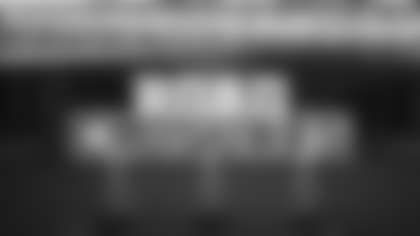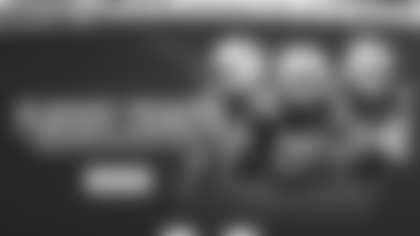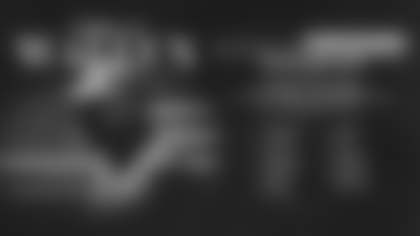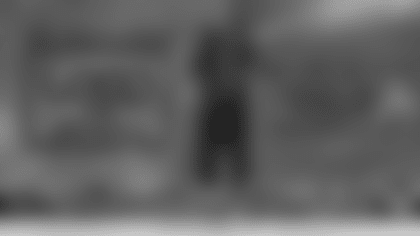Hi-Tech Communications Major Issue Facing NFL, Polian
Says
INDIANAPOLIS - The mission, Bill Polian said, is clear.
And the Colts' President said more than once this past weekend that when it comes to technology in the NFL, the mission is bigger than the immediate and bigger than an upcoming vote on whether to allow coaches to electronically communicate with defensive players in coming seasons.
As a member of the NFL's Competition Committee, Polian said while coach-to-player, electronic communication is a major issue, it's just part of the landscape of a more imant issues facing the league.
The set of issues?
Hi-tech communications – specifically, how technological innovations will shape the game.
How the NFL handles the issue – and the steps it will take to ensure the league takes advantage of technological improvements while maintaining fair playing conditions – is the charge of the Competition Committee, Polian said.
It's a charge Polian said must be taken seriously.
"The whole communication issue in my view is the overriding issue," Polian said this past weekend at the NFL Scouting Combine, which concluded Tuesday at the RCA Dome in downtown Indianapolis.
"We're going to have hi-tech communication going forward. How do we secure it? How do we make sure it is not subject to shenanigans of any kind? How do we make sure it's efficient? How do we make sure the playing field is level for everybody?
"That's the question the Competition Committee has to wrestle with."
Polian said the Competition Committee considered the issue last week, when it met at the Combine, and it is expected to be a high-profile issue at the Competition Committee meetings in March and the NFL Owners Meetings in late March and early April.
The issue has moved to the forefront because of a movement within the NFL to allow defensive coaches to electronically call in signals to a designated defensive player. Currently, offensive coaches can call in signals electronically to quarterbacks, but defensive coaches may not.
At the NFL Owners Meetings last spring, the league owners voted on a proposal to allow defensive coaches electronic communication with on-field players. The measure failed, 22-10, meaning it fell two votes shy of being passed, according to NFL.com.
"We have attempted over the last two years to get the system in," Tennessee Titans Head Coach Jeff Fisher said. "We're currently discussing modifying the proposal so that we'll have a better chance of getting it in. For example, how do you handle the backup situation in the event your identified defensive starter is injured and you lose the ability to communicate to your defense? How do you handle the backup situation? Those are things we're currently discussing."
Quarterbacks this past season had a green dot on their helmet to denote a helmet equipped with a communication device. A sticking point in allowing defenses the same communication system is while the offense has the quarterbacks, the defense lacks the equivalent every-down player.
Asked this past weekend during a media briefing if the league would ever consider having communication in all helmets, Competition Committee members laughed and shook their head.
"Umm, no," Fisher said, adding, "it would be incumbent to have an every-down player be the signal-caller, that's what you're going to have to do. It makes sense to put it on an every-down player."
The movement to allow defensive electronic communication has proponents among defensive coaches.
"Last year I was in favor of it for a linebacker or safety," said Buffalo Bills Head Coach Dick Jauron, a longtime NFL defensive coordinator. "There are some issues involved with it. How many do you have? But I am in favor of it. I think it's a distinctive advantage for the offense."
Said Fisher, "We're looking at a more practical way of handling the backup situation in the event that you lose the key player on defense that's handling the communication. Offensively, we have four quarterback (helmets) identified by the green dot. Defensively you would expect to have multiple helmets on the sideline, but only one on the field at one time.
"So we're just going through the process of ensuring there would not be any confusion as far as if your starter goes down how your backup resumes acquiring the signals."
NFL Commissioner Roger Goodell, while meeting with the Competition Committee last week, stressed the issue, Polian said.
"It's fair to say that every member of the committee wants to make sure that as we go forward with coach-to-defensive-signal-caller we do it in a way that makes sure we have a level playing field throughout," Polian said. "That's our charge traditionally as a committee and the commissioner reiterated that, that he felt that that ought to be a priority. As communications and technology develop, it's our charge as a committee to recommend to the membership procedures that make sure that the playing field is level. But it's difficult. Technology expands exponentially. It's a difficult task."
It's not only difficult, Polian said, it's more important than many of the other issues currently seen as more high-profile.
"That's the overarching issue and it transcends all of the other mundane stuff," Polian said. "Spygate – all that other stuff is tangential. This is the key issue. How do we keep a level playing field going forward in a high-tech era of communication? That's the biggest issue before us as a Competition Committee.
"We have to rely on the representations of the experts – people who are experts in technology, people who have experience with it in other venues, other walks of life. You have to go into it with a clear head and an open mind. You have to believe, like most people who work in that area believe, there's a certain amount of redundancy that has to be built in. These are mechanical things and they're likely to malfunction. There's a cost to that that you have to factor in. You can't say it's going to work 100 percent of the time with one set of phones. You have to think about redundancy.
"Those are all details. The overarching in this is how we level the playing field at a time when hi-tech communication is an issue."
COMBINE UPDATE: The last day of the Scouting Combine featured the workouts of the cornerbacks and safeties, with cornerback Tyvon Branch of Connecticut turning in the day's best 40-yard dash time at 4:31 seconds.
Among cornerbacks, Orlando Scandrick of Boise State was next at 4.32, followed by Dominique Rodgers-Cromartie of Tennessee State at 4.33, Tracy Porter of Indiana at 4.37 and Michael Grant of Arkansas at 4.37.
Among safeties, Josh Barrett of Arizona State had the fastest 40-yard dash time at 4.35.
In the bench press, Antwaun Molden of Eastern Kentucky led all cornerbacks with 23 repetitions at 225 pounds, followed by Justin Tryon of Arizona State with 21, Antoine Cason of Arizona with 20, Jonathan Wilhite of Auburn with 20 and Jack Williams of Kent State and Branch with 19.
Among safeties, Tyrell Johnson of Arkansas State led with 27 repetitions, followed by Tom Zbikowski of Notre Dame at 24, Caleb Campbell of Army at 24, Dominique Barber of Minnesota at 23 and DaJuan Morgan of North Carolina State at 21.














